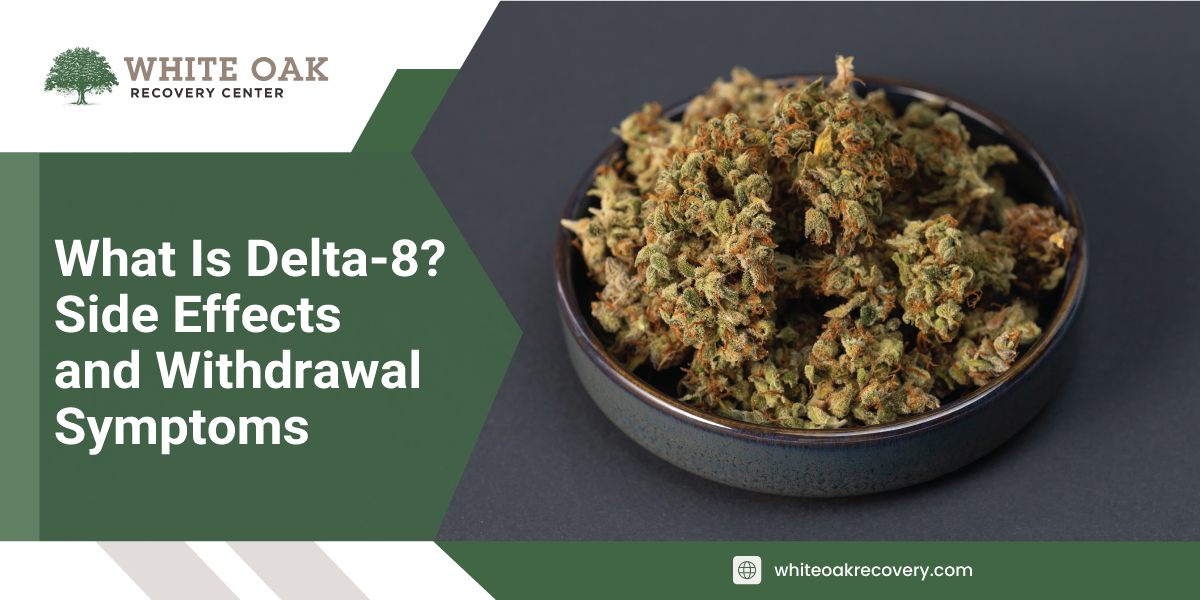What Is Delta-8? Side Effects and Withdrawal Symptoms


Medical Writer:
Reviewer:

Johnny Kim
Executive Psychotherapist
Medical Writer:
Reviewer:

Johnny Kim
Executive Psychotherapist
Marketed under names like “diet weed” and “marijuana lite,” Delta-8 or Delta-8 THC is a new psychoactive substance seen as a less potent alternative to traditional cannabis products. Although delta-8-tetrahydrocannabinol (Delta-8 THC) is a naturally occurring cannabinoid found in the cannabis plant, the US Food and Drug Administration (FDA) warns that it has serious public health risks.
Table of Contents
Toggle
What Is Delta-8?
Delta-8-tetrahydrocannabinol, commonly known as Delta-8 THC, is a psychoactive substance that is currently being sold in stores at gas stations, novelty smoke shops, and online. Like most new psychoactive substances, it doesn’t have a legal status, and it is not a controlled substance; it is a naturally occurring cannabinoid found in the cannabis plant but is associated with dangerous health effects.
This compound, while less prevalent than its more famous cousins Delta-9 and Delta-10, has gained significant attention for its psychoactive effects, which are milder yet similar to Delta-9 THC. Delta-8 THC is unregulated and has small concentrations of the Cannabis sativa plant in its products.
Delta-8 is derived from hemp, a variety of cannabis that is low in Delta-9 THC, through a process involving the conversion of cannabidiol (CBD). This process has become popular due to the 2018 Farm Bill, which legalized hemp and its derivatives as long as they contain less than 0.3% Delta-9 THC.
However, Delta-8 exists in a legal gray area because it is not naturally abundant and often requires synthetic conversion from CBD, raising questions about its regulation.
It binds to the CB1 receptors in the brain, producing effects such as euphoria, relaxation, and altered sensory perception. However, because it is less psychoactive, users often perceive it as a safer option, though this perception is not accurate.

Side Effects of Delta-8
Despite being marketed as a natural, milder alternative to cannabis, Delta-8 THC has various side effects. Depending on the dosage and personal sensitivity, users may experience a range of physical and psychological reactions.
Common side effects include:
- Dry mouth
- Red eyes
- Increased heart rate
- Dizziness
- Drowsiness
- Anxiety
- Paranoia
- Panic attacks
- Headaches
- Nausea and vomiting
While these side effects are generally mild and short-lived, there are concerns about the long-term effects of Delta-8 THC. Since the compound is often synthesized and not approved by the FDA, there is a risk of consuming harmful chemicals or impurities that may arise during manufacturing.
The unregulated nature of Delta-8 products means that quality and safety can vary significantly. Consumers may unknowingly consume products containing harmful additives or contaminants, which could lead to unforeseen health issues.
Reports from poison control centers have indicated an uptick in adverse reactions linked to Delta-8 products, ranging from mild discomfort to more severe symptoms.
This is particularly concerning given the lack of studies on the long-term effects of Delta-8 THC. The potential presence of harmful chemicals in unapproved products highlights the importance of choosing reputable sources and remaining informed about what you consume.
Being Addicted to Delta-8
Delta-8 THC, like other cannabinoids, can be habit-forming. Regular use of this substance can still cause addiction. However, the addiction is not as severe as nicotine or opioids. Addiction can happen because the compound makes you feel good and can become a habit.
Both cannabinoids interact with the brain’s endocannabinoid system, particularly the CB1 receptors, which regulate mood, memory, and reward. This interaction can cause some users to become dependent on the substance. This is especially true for those who use it as a way to deal with stress, anxiety, or other problems. Over time, people who use drugs often may need to take more to feel the same effects, which can make them more dependent.
It’s important to know that even though Delta-8 THC may seem less strong, it can still be addictive. Users may consume it more frequently and in larger quantities, seeking to replicate the initial effects. This can lead to a cycle of dependency. The substance becomes the primary method for coping with emotional or psychological difficulties.
Additionally, being addicted to Delta-8 can have social and psychological consequences. Recognizing addiction signs early is important. Signs include using more of a substance than planned, being unable to cut down, and experiencing withdrawal symptoms.
Delta-8 Withdrawal
Withdrawal symptoms can occur when a person who regularly uses Delta-8 THC suddenly stops. These symptoms can range from mild to moderately severe, depending on the individual’s usage pattern and physiological response. Common withdrawal symptoms include:
Irritability and Mood Swings: As the body adjusts to the absence of Delta-8, people may experience increased irritability and emotional instability, making social interactions more challenging.
Sleep Disturbances: Difficulty falling asleep or staying asleep is a common withdrawal symptom, as Delta-8 can influence sleep patterns. Insomnia or disrupted sleep can lead to daytime fatigue and decreased cognitive function.
Reduced Appetite: Users may experience a decrease in appetite, which contrasts with the “munchies” often associated with cannabis use. This change in appetite can affect overall nutrition and energy levels.
Physical Discomfort: This can include headaches, nausea, and general malaise, although these symptoms are typically less intense than those experienced with Delta-9 or Delta-10 withdrawal. Some users may also experience gastrointestinal discomfort or muscle aches.
The onset and duration of withdrawal symptoms can vary. Some people may experience symptoms within a few hours of their last use, while others may not notice effects for a day or two.
The withdrawal symptoms usually peak within the first week and gradually subside. However, psychological symptoms, such as anxiety and cravings, can persist for longer, potentially complicating the recovery process.
Stopping Delta-8 can be tough for those who use it to self-medicate for anxiety or chronic pain. Not having the substance can make it harder to manage daily life with these conditions so professional help may be needed.

Delta-8 THC Addiction Treatment at White Oak Recovery Center
If you or someone you know is struggling with Delta-8 THC addiction, it is crucial to seek help. At White Oak Recovery Center, we provide comprehensive, evidence-based substance use and co-occurring disorder treatment in a luxury inpatient treatment center. Our compassionate, experienced team of professionals collaborates with you to design a personalized treatment plan that addresses your specific needs and goals.
In addition to our medical detox program, we use medication-assisted treatment and dual diagnosis to safely get you through withdrawal and address any co-occurring mental condition.
WORC also uses numerous talk and behavioral therapies, such as cognitive-behavioral therapy (CBT), that help people understand the underlying causes of their addiction and develop healthier coping strategies. Individual therapy can also help you develop healthy coping strategies that help you avoid relapse and remain in recovery.
Contact us today to learn more about available treatment program options and take the first step toward recovery. Our treatment specialists are eager to hear your story and help you stay rooted in recovery for life. Freedom from addiction can start with just a phone call.

Am I covered for addiction treatment?
Your insurance may cover treatment. Call now for an entirely free and confidential assessment. Recovery starts with a phone call.

- “5 Things to Know About Delta-8 Tetrahydrocannabinol – Delta-8 THC.” US Food and Drug Administration, May 2022.
- Miller, Chelsea R., et al., “Delta – 8 – THC Association with Psychosis: A Case Report with Literature Review.” Frontier Psychiatry, Feb. 2023.
- “Delta-8 THC.” America’s Poison Centers, Jul. 2024.
- Harlow, Alyssa F., et al., “Adolescent Δ8-THC and Marijuana Use in the US.” JAMA Network, Mar. 2024.
- “Delta-8-Tetrahydrocannabinol.” National Cancer Institute, Jul. 2024.
Medical Disclaimer:







